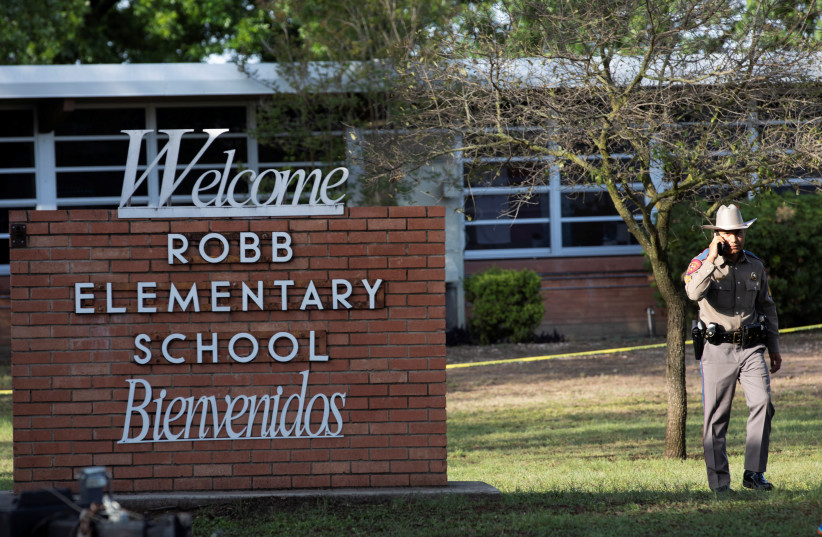Uvalde is what people are talking about.
Since the massacre of 19 children and two teachers in Uvalde, Texas, it has been the topic of nearly every single conversation in my world – and not just in my world.
Before Tuesday, May 24, almost no one outside the area had even heard of Uvalde or Uvalde County – unless you were tracking illegal immigrants entering the United States. Now the small city of 15,000 people, located 64 km. from San Antonio and 48 km. from the Rio Grande border with Mexico, is easily on the tip of everyone’s tongue. It’s a household name.
This school and many others in the district experience a real lockdown at least once a week. Uvalde is on the path of illegal immigrants. And the lockdown is initiated when a dangerous suspect is thought to be on the move near their school.
Most discussions are about gun control or about finding out what happened or about what, when and why everything went wrong.

In my world, however, another question looms large. Sometimes the question is raised front and center. Sometimes, it lurks in the background – the unspoken proverbial elephant in the room. The question is: How safe are our Jewish agencies and organizations, our shuls and synagogues and temples, our day schools and Hebrew schools? How safe?
As of this writing, Robb Elementary seems to have been the unlucky straw picked by an 18-year-old on a murder spree. I am leaving his name unsaid. I do not like to promote the names of these murderers. For many, the hope is that their horrific act will bring them fame and notoriety. I will not facilitate that hope. Theirs are not the names to be remembered. It is the names and lives and stories of the victims that deserve to be remembered.
Unlike secular schools across America that are targets of deranged mass murderers – like in Sandy Hook or Uvalde – threats against identifiable Jewish locales are obvious, soft targets.
THE REASONS are clear to everyone. Jews are targets of violent hate.
The reasons for such hatred and the ensuing violence, on the other hand, is the subject of endless debate. Debates that will not and cannot be resolved. One thing is for certain: Jews and Israel are not the cause of Jew-hatred. Jew-hatred exists, palpably exists, even in areas where Jews have never, ever, existed.
And this hatred begets violence.
There is no solution to this hate; we have been trying to find one for centuries. Yet, that does not mean that Jews must be targeted or that we should allow ourselves to be targets. Instead, we must harden the target, thereby making Jewish targets safer.
Jewish communities spend a significant amount of their annual budget on security. On average about 10% to 20%. That is a pretty penny that is not going to education, not going towards fixing leaks or broken air conditioning, not going to outreach or programming or salaries.
In the aftermath of COVID, people are slowly, finally, returning to synagogues and community activities. Before COVID struck, security was a priority in the Jewish world. It was a burden and a responsibility that everyone bore and accepted. Since COVID, I have witnessed a lax attitude by individuals. Doors are allowed to remain open. Security details do not maintain the same outside presence. Maybe it’s deliberate. Maybe it’s a weariness with restrictive regulations. I’ve even seen people disabling auto-locks on doors during services.
That’s not only foolish, it’s downright dangerous. It was an open door – a propped open door we are being told by authorities, that allowed for the invasion of a killer into a school in Texas.
Schools are easy targets in the US. School shootings pull at our heartstrings. Schools are buildings that should be safe learning environments but are turning into the stuff of nightmares.
According to a Newsweek article, World Population Review records the number of school shootings in the US at 288. Education Week puts the number of school shootings since 2018 at 119. According to their records, the shooting in Uvalde is the 27th school shooting of 2022.
Schools can learn from the Jewish community. Securing a school takes three things. It takes money. It takes a plan. It takes educating people so that the plan is implemented.
Boards of education and local, state and federal governments need to allocate more money to school safety. Parents need to be involved. School administrators need to drill. Police need to coordinate and practice real time active shooter exercises.
We cannot shut down our institutions. But we can work harder and work better at protecting them. Shutting down goes against the very essence of who we are what those institutions mean to us.
The word “school” comes first from the Greek “skole.” It originally meant leisure or a place where one came for a leisurely activity, like a lecture. In Latin “skola” is similar and more specific, a place of instruction. From the Latin the word spread to almost every other European language. The Yiddish word “shul” comes from the German. The shul was a Beit Midrash, a House of Learning. Synagogue is from the Greek. It is a direct translation of the Hebrew Beit HaKenesset, the House of Assembly.
Our lives, our culture, compel us to gather and learn. We need to do our best so that we may gather and learn, in safety.
The writer is a columnist and a social and political commentator. Watch his new TV show Thinking Out Loud on JBS.
